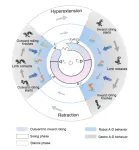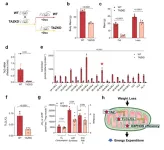(Press-News.org) (WASHINGTON, DC, April 18, 2023) – Children with acute lymphoblastic leukemia (ALL) who live in extreme poverty and were undergoing maintenance therapy faced an almost two-fold greater risk of relapse compared with kids who weren’t as poor, according to a study published in today’s issue of Blood. Moreover, a higher proportion of these children had difficulty adhering to treatment, though researchers said this only partially explains the link between poverty and the risk of relapse.
“ALL is a curable disease, so while we observed relatively few relapses in total, children living in extreme poverty – those whose families were really stretched thin and not able to make ends meet – had a significantly higher risk of relapse, even after controlling for all other biologic and prognostic factors,” said Aman Wadhwa, MD, MSPH, pediatric oncologist and health sciences researcher in the Division of Pediatric Hematology/ Oncology at the University of Alabama at Birmingham, and the study’s lead author.
“These children were also much less likely to be able to maintain a critical level of adherence needed for sustained remission during maintenance therapy,” he said. “These findings underscore an urgent need to identify patients with this level of financial hardship and connect them to resources, even if finite, to help.”
For example, if transportation is an issue, providing gas cards or ride shares can make a difference. Providing plain language education about the importance of staying on maintenance therapy may also help.
ALL, which affects the blood and bone marrow, is the most common childhood cancer. In fact, more than half of ALL cases (about 60%) occur in children, and five-year survival rates now approach 90% thanks to advances in treatment, though this isn’t true for or equitable across all children, according to Dr. Wadhwa.
He added that this is the first study to look at the effect of individual level poverty using annual household income and its effect on relapse rates among children with ALL. Previous research has relied on community measures of poverty – for example, using zip codes within which there can be wide variations in socioeconomic status – or health insurance status.
This study, a secondary analysis of the Children’s Oncology Group Study that examined adherence to oral 6-mercaptopurine during maintenance therapy for ALL, included 592 patients. Patients were enrolled between 2006 and 2012 and followed for a median of 7.9 years. Two-thirds of patients were male. The median age at diagnosis and enrollment was 5 and 6 years of age, respectively. The most commonly reported race/ethnicity was Hispanic (35%), followed by non-Hispanic white (32.4%), Black (18.2%), and Asian (14.4%). Overall, 34.8% of parents reported their education as high school or lower. Researchers collected self-reported individual income information at the start of the study and used data from the U.S. Census Bureau to group patients as living above or below federal poverty threshold. Among those living in poverty, patients were characterized as living in extreme poverty if the federal poverty threshold was over 120% of the yearly household income.
More than 12% of children that participated in the study were living in extreme poverty. Children living in extreme poverty were more likely to report being Hispanic or Black and having more household members (six vs four people on average). There were no differences in disease or treatment intensity by poverty status. Rates of relapse at three years after enrollment were nearly double among children living in extreme poverty compared to those above the poverty threshold, 14.3% vs 7.6%. Compared to children not living in extreme poverty, those living in extreme poverty were significantly more likely to be nonadherent to prescribed treatment (57.1% vs 40.9%).
Extreme poverty, like other social determinants of health, was on par with some clinical measures used to risk stratify patients, Dr. Wadhwa explained.
“When I see someone with a new diagnosis of ALL, we look at biological factors that a patient walks in with – to determine if they have standard or high-risk disease. Patients at high-risk are 2.5 times more likely to relapse, that’s similar to the risk of relapse that we are finding with extreme poverty and other social determinants of health,” he said.
The findings underscore the need for interventions that assess and develop tailored solutions to make sure patients have equitable access to care.
“If we are going to risk stratify patients and give different treatments based on certain biological factors, then why not design interventions and treat these social factors that are also increasing their risk of relapse,” Dr. Wadhwa said. “There are only so many gains we may be able to make by continuing to intensify therapy. We can come up with the best treatment in the world, but if the patient doesn’t get it, then of what use was it?”
To date, poverty and other barriers to optimal care aren’t routinely assessed or considered as part of treatment planning, but this may be necessary in order to improve outcomes among certain populations.
This study is limited in its relatively small sample size and was conducted before measurable residual disease was a routine part of clinical care. Still, the findings lay the foundation for future research to examine other social determinants of health and their potential role in childhood cancers, as well as inform interventions to address these barriers.
# # #
Blood (www.bloodjournal.org), the most cited peer-reviewed publication in the field of hematology, is available weekly in print and online. Blood is a journal of the American Society of Hematology (ASH) (www.hematology.org).
Contact:
Kira Sampson, American Society of Hematology
ksampson@hematology.org; 202-499-1796
END
Vitamin D deficiency could be the reason African American men experience more aggressive prostate cancer at a younger age compared with European American men, new research from Cedars-Sinai Cancer suggests. The multi-institutional study, published today in Cancer Research Communications, a journal of the American Association for Cancer Research (AACR), could pave the way for revised nutritional guidelines.
While previous research has investigated vitamin D in the context of health disparities, this is the first study to look at its functions in a genome-wide manner in African American versus European American ...
New York, New York — The American Federation for Aging Research (AFAR) and Hevolution Foundation are pleased to announce the inaugural Hevolution/AFAR New Investigator Awards in Aging Biology and Geroscience Research recipients. Eighteen three-year awards of US $375,000 each have been granted to support research projects in basic biology of aging or geroscience — a research paradigm based on addressing the biology of ...
NEWPORT NEWS, VA – In a unique analysis of experimental data, nuclear physicists have made the first-ever observations of how lambda particles, so-called “strange matter,” are produced by a specific process called semi-inclusive deep inelastic scattering (SIDIS). What’s more, these data hint that the building blocks of protons, quarks and gluons, are capable of marching through the atomic nucleus in pairs called diquarks, at least part of the time. These results come from an experiment conducted at the U.S. Department of Energy’s Thomas Jefferson National Accelerator Facility.
It’s a result that has been ...
INDIANAPOLIS – Serving on the front lines in the arduous battle against the coronavirus, emergency department (ED) physicians are among the true heroes of the pandemic, working long, stressful hours at great personal risk, especially in the many months before vaccines became available. A pilot study examining the feasibility, receptivity and preliminary effectiveness of peer-support groups for ED doctors during COVID-19 found this support provided potential benefit in terms of reduction of mental health stresses involved in emergency care during this time.
The researchers assessed change in symptoms of distress, depression and burnout before and after participating ...
Public health messages that focus on protecting others are more effective at increasing vaccination rates than messages focused on protecting oneself, according to a study. Vaccine hesitancy is a challenge for public health workers and others concerned with reducing the deleterious effects of infectious diseases. Elizabeth Shanahan and colleagues tested three visual policy narrative messages promoting COVID-19 vaccination that emphasized protecting oneself, one’s circle of friends and family, or one’s community. A non-narrative control message simply urged participants to “get the vaccine” with an accompanying image of a syringe. ...
A research article by scientists at the Nanjing University of Aeronautics and Astronautics developed a neural control algorithm to coordinate the adhesive toes and limbs of the climbing robot. The new research article, published in the journal Cyborg and Bionic Systems, provided a novel hybrid-driven climbing robot and introduced a neural control method based on CPG (Central Pattern Generator) for coordinating between adhesion and motion.
“Currently, the movement speed and stability of climbing robots have not yet reached the level of biological organisms. Animals have flexible climbing abilities on various slopes and roughness, ...
Children with COVID-19 can be treated safely at home, helping to take the burden off the hospital system, according to a new study.
The research, led by Murdoch Children’s Research Institute and published in Archives of Disease in Childhood, found COVID-positive children with moderate symptoms or pre-existing high-risk conditions could be treated effectively via a Hospital-in-the-Home (HITH) program. Additionally, many more sick children without COVID-19 were treated at home during the pandemic.
Murdoch Children’s Dr Laila Ibrahim said the program took pressure off paediatric emergency departments ...
Weight regains is a common problem for weight loss individuals. A number of studies have shown that weight loss in overweight people results in a reduction in whole-body energy expenditure. This reduction in energy expenditure is disproportionate across tissues, known as energetic mismatch which primarily originates from lean tissue, thus increasing weight regain risk. Although this phenomenon has long been identified and has been suggested that weight loss may alter skeletal muscle mitochondrial respiration, the mechanisms ...
Ocean-based hydrophones in the Comprehensive Nuclear-Test-Ban Treaty Organization (CTBTO)’s seismic-acoustic monitoring network could provide a better look at how ocean temperatures are changing over time, according to a presentation at the Seismological Society of America (SSA)’s 2023 Annual Meeting.
Finding new ways to monitor ocean temperatures is important for determining rates of warming, sea level rise and climate-related ocean circulation patterns as average global temperatures continue to rise, the researchers said.
Sound ...
In the wake of the 2020-2021 Southwest Puerto Rico earthquake sequence, researchers asked emergency responders and residents in affected communities about the information they needed to prepare for the next earthquake.
Residents surveyed door to door and in focus groups said they wanted to know more about and have easier access to an aftershock forecast, along with information on potential tsunami risk, according to a presentation at the SSA 2023 Annual Meeting.
Residents also wanted more information tailored specifically to their local area, said Jenniffer M. Santos-Hernández ...



